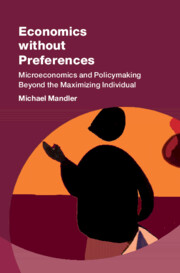Book contents
- Frontmatter
- Contents
- Figures
- Preface
- 1 Introduction: Marginal Utility Matters
- Part I Trade-Offs and Rationality
- Part II Economic Analysis and Policy Without Preferences
- 7 Marginal Utility and the Volatility of Prices
- 8 The Trouble with Welfare Economics
- 9 Welfare and Policymaking: Pareto without Preferences
- 10 Utilitarianism without Utility
- 11 Production and the Enforcement of Rationality
- 12 Conclusion: Custom and Flexibility
- Appendix
- Bibliography
- Index
11 - Production and the Enforcement of Rationality
from Part II - Economic Analysis and Policy Without Preferences
Published online by Cambridge University Press: 02 January 2025
- Frontmatter
- Contents
- Figures
- Preface
- 1 Introduction: Marginal Utility Matters
- Part I Trade-Offs and Rationality
- Part II Economic Analysis and Policy Without Preferences
- 7 Marginal Utility and the Volatility of Prices
- 8 The Trouble with Welfare Economics
- 9 Welfare and Policymaking: Pareto without Preferences
- 10 Utilitarianism without Utility
- 11 Production and the Enforcement of Rationality
- 12 Conclusion: Custom and Flexibility
- Appendix
- Bibliography
- Index
Summary
Production rather than preferences should play the leading role in the theory of markets, as in the book’s analysis of volatility and policymaking. Production is not only the fount of social wealth, it is organized by firms whose decisions are guided by a clear ordering principle, their profitability. There is moreover an institution, the market, that can weed out the firms that fail to pursue profits effectively. But the purging of inefficiency by the market confronts policymakers with the dilemmas of Schumpeterian creative destruction. Policies that compensate firms and their owners for any declines in profitability will also dampen the threat of bankruptcy; the enforcement of productive efficiency can require unfettered competition. An application to international trade illustrates some of the challenges: For foreign competition to lead to productive efficiency, domestic prices must be aligned with world prices, which will push some firms into liquidation.
- Type
- Chapter
- Information
- Economics without PreferencesMicroeconomics and Policymaking Beyond the Maximizing Individual, pp. 213 - 222Publisher: Cambridge University PressPrint publication year: 2025

